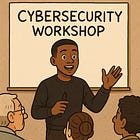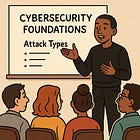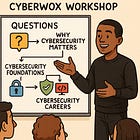Cybersecurity Mistakes Keeping You Stuck (and How to Fix Them)
Five common mistakes that derail aspiring cybersecurity professionals and how to avoid them before they kill your career progress.
Let’s be honest: the internet is full of endless tutorials, bootcamps, and videos that promise to “get you into cybersecurity.” However, if you’re not careful, you could inadvertently sabotage your career instead of accelerating it.
I’ve been in this space for five years now, working as a security engineer, mentoring hundreds of students, and teaching thousands through YouTube and Cyberwox Academy.
I’ve seen brilliant people stall out not because they weren’t smart enough, but because of a few career-killing habits.
If you want to actually land that cybersecurity role and grow, you need to avoid these traps.
In Case You Missed It
I recently went through a cybersecurity 101 series. I’m sure you didn’t miss it, but if you did, here’s the whole workshop series in order:
Mistake #1: Learning Everything at Once
I’ve seen people trying to juggle Linux, PowerShell, Splunk, malware analysis, and offensive security… all at the same time. That’s not ambition. That’s burnout.
Cybersecurity is too deep a field for you to scatter your focus everywhere.
You need to choose a lane first.
If you want to break into systems and networks and get paid to find vulnerabilities, choose offensive security.
If you want to defend against malicious attackers, detect threats, and build security controls, choose defensive security.
Once you’ve built a foundation, you can always pivot. I’ve pivoted myself.
This field is flexible, but only if you build depth before chasing breadth.
Mistake #2: Believing a Single Certification Will Save You
I love seeing people celebrate when they pass Security+, OSCP, or CCD. But here’s the truth: a cert alone won’t get you the job.
A certification is a signal of effort, not proof of ability.
To stand out, you need to stack it with:
Projects that show you can apply your knowledge.
Advanced or specialized training in your chosen area.
A strong resume and portfolio.
Think of certs as a door-opener. Just because a door is open doesn’t mean you’re in the house.
Mistake #3: Not Having a Structured Plan
Jumping between random YouTube tutorials, free PDFs, and half-finished labs is how people waste years.
That could be a degree, a bootcamp, or even a self-made plan. Personally, I built a six-month Cybersecurity Learning Framework to help beginners stay on track, and it works because it forces you to commit to a path and see it through.
Structure creates momentum. Without it, you’ll stay stuck in “learning mode” forever.
Mistake #4: Chasing Shiny Objects
This one hits close to home for me.
It’s so tempting to jump on the new hype wave of AI, blockchain, and cloud-native security right away, abandoning what you’re currently learning.
One minute you’re deep into a Windows memory analysis lab, the next you’re signing up for an “AI security” course you don’t even understand.
Here’s the fix: define your exact goal.
Do you want to become:
A detection engineer?
An incident responder?
A cloud security engineer?
An offensive security specialist?
Each of those paths requires specific skills.
Until you pick a target, you’ll keep drifting.
Mistake #5: Neglecting Networking & Mentorship
I can’t stress this enough: relationships move careers.
Cybersecurity is full of hidden opportunities, such as referrals, projects, collaborations, and even jobs that never hit LinkedIn job boards.
I’ve seen people land life-changing roles simply because they were active in their communities, attended conferences, or found the right mentor (me included).
Yes, your skills matter. However, your network will accelerate your growth in ways that a pure technical grind never will.
Join a vibrant cybersecurity community of over 6,900 people who are constantly engaging in conversations and supporting one another, covering topics from cybersecurity and college to certifications, resume assistance, and various non-professional interests like reading, fitness, finance, anime, and other exciting subjects.
The Bottom Line
Cybersecurity is huge.
There are countless domains, endless new tools, and more hype than you can keep up with. If you want to survive and thrive, you need to:
Focus deeply before broadening out.
Build beyond certs with real projects.
Stick to a structured plan.
Ignore distractions until you’ve mastered the fundamentals.
Invest in people as much as you invest in skills.
Your progress isn’t solely determined by your knowledge, but also by how you handle the journey.
The good news? These mistakes are fixable. Start now, and you can avoid wasting years of effort.








